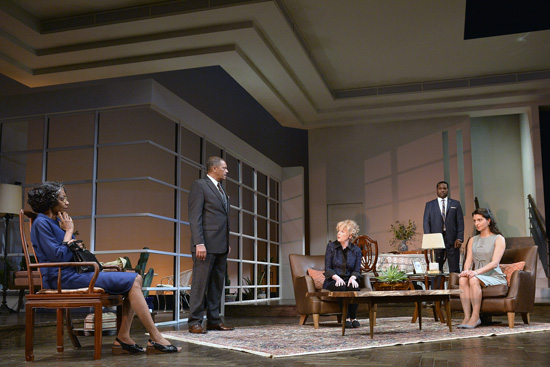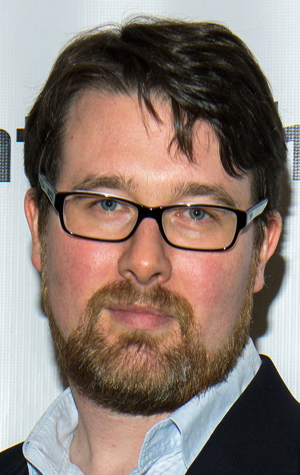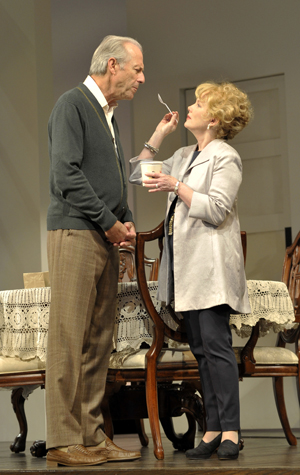Huntington Presents Guess Who’s Coming to Dinner
New stage adaptation of classic film kicks off new season

Adriane Lenox (from left), Lonnie Farmer, Julia Duffy, Malcolm-Jamal Warner, and Meredith Forlenza in the Huntington Theatre Company’s production of Todd Kreidler’s Guess Who’s Coming to Dinner. Photo by Paul Marotta
Watching the 1967 Oscar-winning film Guess Who’s Coming to Dinner today, it’s hard to imagine that it was once considered daring and controversial. A kind of old-fashioned drawing room comedy, the film is best remembered now for its star turns by Katharine Hepburn, Spencer Tracy, and Sidney Poitier, all of whom were nominated for Oscars (Hepburn won for Best Actress). But at the time, its plot about an interracial love story struck a nerve. The film arrived in theaters just six months after the Supreme Court had struck down antimiscegenation laws in the landmark Loving v. Virginia decision, and many cinemas in the South refused to show it, fearing riots and violence.
Hepburn and Tracy played Matt and Christina Drayton, liberal white parents of a young woman, Joey, who returns home to tell them she has fallen in love with an African American doctor named John Prentice, Jr. (Poitier). But Prentice will marry her only if her parents consent. His parents arrive at the Draytons’ for dinner, and the young couple’s fate is debated, and ultimately, decided.
Now, nearly 50 years later, a new stage adaptation by playwright Todd Kreidler, starring Malcolm-Jamal Warner (Theo Huxtable from the Cosby Show) as the younger Prentice, is kicking off the Huntington Theatre Company’s 32nd season. While the play, like the film, is set in the late ’60s and retains many of the movie’s iconic moments, it examines the subject of race in a way the film couldn’t at the time. And rather than keep the play a star vehicle, Kreidler gives all of the characters equal footing.
A former dramaturg for the late Pulitzer prize–winning playwright August Wilson (Hon.’96), Kreidler was first asked to adapt the film for the stage seven years ago by Kenny Leon, who had directed many of Wilson’s works on Broadway and in regional theaters, including the Huntington. Kreidler acknowledges that he was initially skeptical. “Seven years ago, the idea of taking a film to the stage—why do that?” he says. “Also, I wondered, does this piece have any social relevance?” After watching the film again and thinking about it, he thought that it might, and began work on a new version. Then the economic recession hit and plans to mount a stage production were put on hold. The play finally debuted in 2012 at Leon’s True Colors Theatre in Atlanta.
Kreidler, who was still tweaking the play with the help of Obie-winning director David Esbjornson days before the Huntington opening, has taken pains to make the story relevant to modern audiences, who are largely supportive of interracial marriage. “The movie was very much an issue-driven piece, whereas I feel the play is a character-driven piece,” Kreidler says. “The issue is still there, and they’re responding to the issue, but really, it’s about a family. It’s about what happens when you have to encounter your idealism in the flesh. It’s about love as it’s discovered and maintained and survives, with loss in the background.”
In reimagining the material, Kreidler introduces the audience to Matt and Christina, and their black maid, Tillie, before bringing in the young couple. He has also fleshed out the roles of Prentice’s parents. “Even if their stage time isn’t equivalent to the Draytons’, I think their impact to the story is just as important,” he says.

Many critics derided the film’s presentation of Prentice as too saintly, too good to be true, but director Stanley Kramer had argued that he had to make him idealistically perfect so that the only objection to his marriage to Joanna would be the color of his skin. Kreidler has humanized him. “The doctor is flawed, just like all the characters are flawed, just like we’re all flawed,” says the playwright. In both the play and the film, the doctor has lost his wife and young son in an accident, a tragedy that explains his relentless drive. Kreidler has also given Matt and Christina a tragedy of their own (a plot twist not in the film) so that both families are united by loss.
Kreidler says the play’s exploration of race will speak to anyone who has been following the shooting death of a young unarmed black man by a white police officer in Ferguson, Mo., last month. “We’re living in two Americas,” says Kreidler, who is white. “There’s an experience for black America that is totally unknown to white America, and there’s an everyday reality, particularly for young black men being criminalized from the time they first step into a candy store to being shot by the police. There’s that experience in black America and it’s still alive today. We don’t talk about it…we continue to have endemic poverty, cycles of violence, disproportionate incarceration of young black men. So I think what comes to bear here is not so much the mixed couple, but the fact that we have two Americas.”
Kreidler says he was also interested in examining the generational divide that exists in both families in a way that the film didn’t. “What happens when you leave your parents’ house and come back as an adult? I think that there’s a hook to young audiences. I really looked at the young woman in the story. As one character says, ‘She leaves home a Joey and comes home a Joanna.’”
In one other major departure from the film, Matt Drayton does not get to decide his daughter’s fate in the stage adaptation. By the time he offers his opinion, everyone else has already rendered theirs, largely stripping the character of the power he had in the film. And it’s Prentice’s father, in the final scene, who winds up providing the play’s most important voice.
In addition to Warner, the Huntington production stars Julia Duffy, best known for her Emmy-nominated performance as Stephanie, the spoiled maid on the long-running hit show Newhart, as Christina Drayton, Will Lyman (CFA’72) as Matt Drayton, and Tony-winner Adriane Lenox (Doubt) as Mary Prentice, the doctor’s mother.
Duffy, who has spent much of the last decade on stage, says she was skeptical when she first heard there was a stage version of the film, but was surprised by how well it worked as she read the script. “I could totally picture it on stage,” she says, adding that the parents are much more relatable in the stage version because they’re not being played by larger-than-life stars. “I can’t compete with an icon, nor will I try,” says Duffy, whose role is so closely identified with Hepburn. The actress believes the play is an important reminder “of how utterly pointless the gulf between the races is.”

Lyman, one of Boston’s most prominent stage actors and a recipient of multiple Elliot Norton Awards, may be best known for his work as the longtime narrator of the PBS documentary series Frontline. But as an actor, he is no stranger to playing family patriarchs (Joe Keller in Arthur Miller’s All My Sons at the Huntington, James Tyrone in Eugene O’Neill’s Long Day’s Journey Into Night at New Rep). Playing Matt Drayton has given him a chance to explore “how prejudice works in a person who has preached liberality all his life,” he says, adding that “Matt Drayton is a driven Type A, and I’m pretty much the opposite end of that scale. So it’s been kind of fun being somebody who expects to be able to shape the world to his own vision, especially when he is suddenly surprised at his inability to do it.”
Like Duffy, Lyman believes this Guess Who’s Coming to Dinner will resonate with contemporary audiences. “I think it has deepened from a screenplay about learning to accept each other into a play that points up the actual pain and heartbreak that result from an us-them, or I guess I should say, a we-they society. There is the very real specter of loss tied to our ‘blind hatred and stupid fears.’ And that loss, not only of our humanity, but of those we love, is something that we don’t always recognize as the price, ironically, of holding too strongly to what we are afraid of losing.”
The Huntington Theatre Company production of Guess Who’s Coming to Dinner? runs at the BU Theatre, 264 Huntington Ave., Boston, through October 5, 2014. Tickets may be purchased online, by phone at 617-266-0800, or in person at the BU Theatre box office. Patrons 35 and younger may purchase $25 tickets (ID required) for any production, and there is a $5 discount for seniors. Military personnel can purchase tickets for $15, and student tickets are also available for $15. Members of the BU community get $10 off (ID required) and are also eligible for a special subscribers discount rate. Follow the Huntington Theatre Company on Twitter at @huntington.
Comments & Discussion
Boston University moderates comments to facilitate an informed, substantive, civil conversation. Abusive, profane, self-promotional, misleading, incoherent or off-topic comments will be rejected. Moderators are staffed during regular business hours (EST) and can only accept comments written in English. Statistics or facts must include a citation or a link to the citation.